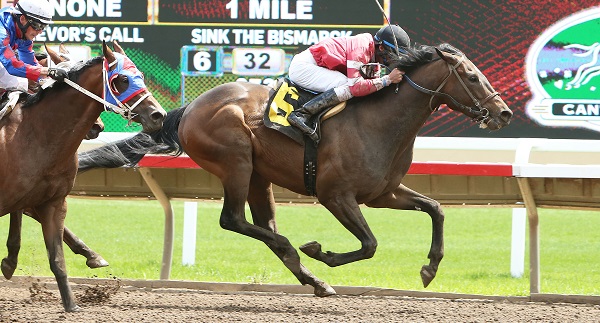BY JIM WELLS
The first race of the third day of racing produced the kind of result that had veteran players shaking their heads in wonder and newcomers wishing they understood the inner workings of the game to cash in on such opportunities.
The newcomers will discover one day that these very opportunities take place outside the boundaries of understanding, which is what makes them “opportunities” in the first place.
The reason a horse pays $67.20 to win, as Sink the Bismarck did in race one, is that bettors avoided him as if he were missing a leg.
In other words, few people saw this one coming, and certainly not the experienced crowd.
For one thing, Sink the Bismarck, a 4-year-old gelding trained by Bruce Riecken, ran on May 3 in Shakopee, finishing second by a half length in maiden claiming company. So, here he was eight days later, trying once again to become a first-time winner. The recent start, a mere eight days earlier, had grizzled veterans delivering wisecracks left and right.
“The trainer should have left him the paddock and saved himself a trip from the barn,” for one.
More common, though, was the hopeful thinking of players who wished they had laid five or ten bucks on the winner. “Could have headed home after the first race if you had that one,” went the refrain.
The larger truth of the matter is that three days into the meet, everyone _ trainers, riders and players alike _ are still trying to figure out the lay of the land. Is the track as deep as some people claim ? If it is, why are some maidens turning in times as swift as those of their elders ? Are some horses still as sharp as they were when they left Arizona, Arkansas, Illinois, or Nebraska three weeks ago or have they lost their edge ?
If the horses in a given race are truly equal, are the riders ? Has anyone of them found a “secret” component to the track, along the rail, in the middle, or outside that might provide a distinct advantage ? Answers to some of those questions sometimes can be found by analyzing post positions and running lanes of winners to date. Three racing cards likely won’t provide any revealing answers.
What is known after three days of racing is this:
Francisco Arrieta, who had a bang-up winter meet at Turf Paradise, claiming the riding title by more than 100 wins, has picked up in Shakopee where he left off in Phoenix. Certainly, he benefited from his association with Robertino Diodoro, who easily won another training title at Turf Paradise. Yet, his riding skills were on full display in the fourth race on Saturday, when he held off challenges from Tapsolute and Top of the Page, to win aboard Izzy the Warrior, Arrieta’s leading sixth win of the meet.
Eddie Martin, Jr., returned to Shakopee after an absence of three years, and is off to a swift start at Canterbury Park. He was aboard Sink the Bismarck in race one Saturday, his third winner of the meet.
Yet, set all of that aside this early in the meet, which has attracted another strong jockey colony that includes former Canterbury riding champions Dean Butler, Ry Eikleberry, Leandro Goncalves and Jareth Loveberry.
The training ranks are equally balanced.
Diodoro and perennial winner Mac Robertson, who tied for the title last season, return with loaded barns. Former champions Dave Van Winkle, Bernell Rhone and Troy Bethke will command large stables as will a host of other contenders _ Miguel Silva, Joel Berndt, Francisco Bravo, Valorie Lund and Tim Padilla.
Veteran players will understand this caveat as well: Few things true today will be valid next week, and fewer still in June or July.
